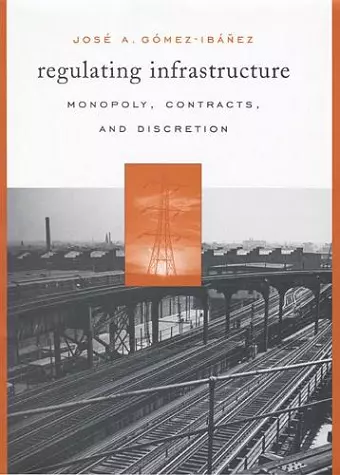Regulating Infrastructure
Monopoly, Contracts, and Discretion
Format:Paperback
Publisher:Harvard University Press
Published:1st Oct '06
Should be back in stock very soon

Regulating Infrastructure: Monopoly, Contracts and Discretion is a book that merges the modern economics of the firm with traditional regulatory concerns in an original and provocative way. It is a valuable contribution to the literature that should be read by anyone concerned with redefining regulation for the new Century. -- Michael E. Levine, Yale Law School
This book addresses a vexing question about privatization: how can government fairly and effectively regulate “natural monopolies”—infrastructure and utility services whose technologies make competition impractical? Gómez-Ibáñez draws on history, politics, and a wealth of examples to provide a road map for various approaches to regulation.
In the 1980s and ’90s many countries turned to the private sector to provide infrastructure and utilities, such as gas, telephones, and highways—with the idea that market-based incentives would control costs and improve the quality of essential services. But subsequent debacles including the collapse of California’s wholesale electricity market and the bankruptcy of Britain’s largest railroad company have raised troubling questions about privatization. This book addresses one of the most vexing of these: how can government fairly and effectively regulate “natural monopolies”—those infrastructure and utility services whose technologies make competition impractical?
Rather than sticking to economics, José Gómez-Ibáñez draws on history, politics, and a wealth of examples to provide a road map for various approaches to regulation. He makes a strong case for favoring market-oriented and contractual approaches—including private contracts between infrastructure providers and customers as well as concession contracts with the government acting as an intermediary—over those that grant government regulators substantial discretion. Contracts can provide stronger protection for infrastructure customers and suppliers—and greater opportunities to tailor services to their mutual advantage. In some cases, however, the requirements of the firms and their customers are too unpredictable for contracts to work, and alternative schemes may be needed.
Regulating Infrastructure: Monopoly, Contracts, and Discretion is a book that merges the modern economics of the firm with traditional regulatory concerns in an original and provocative way. It is a valuable contribution to the literature that should be read by anyone concerned with redefining regulation for the new century. -- Michael E. Levine, Yale Law School
Gómez-Ibáñez uses a rich set of case studies to analyse how and why...different institutional designs are chosen and reformed. The author's range is exceptionally wide: Sri Lanka, the U.S., Britain and Argentina; he tackles telecommunications, railroads, airlines, electricity, buses and water; and spans time periods from the 1950s to today. The result is a remarkable array of examples, information and analyses. In explaining institutional design, he offers a series of fascinating arguments using opportunism and transaction-cost analysis as a starting point rather than as a constraining simplifying theme. -- Mark Thatcher * Times Higher Education Supplement *
ISBN: 9780674022386
Dimensions: 227mm x 146mm x 25mm
Weight: unknown
448 pages